---------------------------------------------------------
Winter winds are howling and a good old-fashioned New England nor’easter is knocking on the door. Most residents are rushing to the grocery store to stock up on batteries, bread, and supplies for their families. Farmers have an additional concern weighing on their minds. How can I keep my animals comfortable in the extreme cold? Luckily, with a little preparation, ducks are super cold hardy animals. Even when temperatures dip into the single digits for a prolonged time, your ducks will be just fine with a little help from you.
Natural insulation
Ducks come equipped with some God-given gifts for weathering harsh weather. They have a double layer of slick, waterproof feathers on top of a thick layer of warm insulating downy feathers. Under all that fluff is a warm, fatty body. They have an average body temperature of around 106-108 degrees F.
Counter Current Blood System
Ducks don’t have fleshy, frostbite-prone wattles & combs like chickens. The only exposed skin ducks have is on their feet. Duck feet have a special counter current blood system. Ducks (and some other birds) have a unique alignment of blood vessels. Their veins and arteries lie next to each other & lace-like capillaries weave among them. Warm blood comes down the legs from the body and meets the cool blood coming from the feet. Heat is exchanged in these special capillaries.
This preserves a core temperature in the feet which can be just above freezing. Just enough to keep the blood moving to feed the tissues. The cooled blood from the feet is warmed before making it’s way back into the body. This helps maintain their core body temperature. Ducks are also able to tuck their feet up into their warm bellies to warm them when on land. They really are an ideal cold-weather farm animal!
Does this mean you don’t need to do anything special for your ducks in the winter? Maybe. It depends on your climate. If temperatures dip below freezing or stay for extended periods below 20 degrees F, your ducks will appreciate a little help from you.
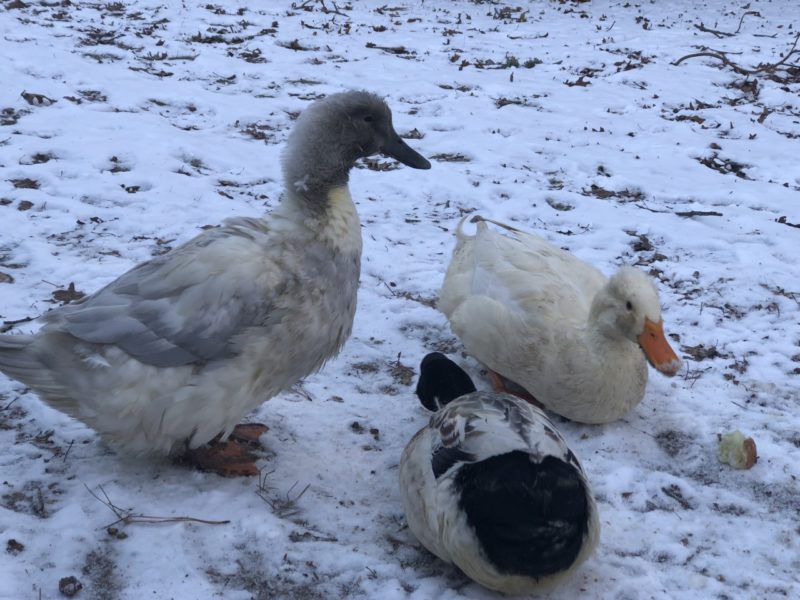
Water
Water is obviously the most important consideration for ducks in the winter. Ducks need access to liquid, unfrozen water to digest their food. They also need it to clear their sinuses & eyes to keep them healthy. If you have access to electricity, the easiest way to keep their water unfrozen is to have a heated dog bowl. Change the water daily to keep it clean. Heated bowls are equipped with a thermostat that will kick in when the temperatures dip below freezing.
I would suggest keeping the water outside of the coop. If you put it inside, they will spend the night splashing about making a mess. The splashed water outside the bowl will freeze. This will lower the temp in the coop and increase the moisture and risk of frostbite.
Remember ducks should not be given access to food without water. They could choke on dry feed. If they don’t have access to water overnight, they should also not have access to food.
While ducks do love to swim, it isn’t really necessary to provide swimming water. It can be difficult to maintain a swimming pool for them in freezing temperatures. I usually settle for pulling out the pool every once in a while on the rare, sunny, “warmish” winter days.
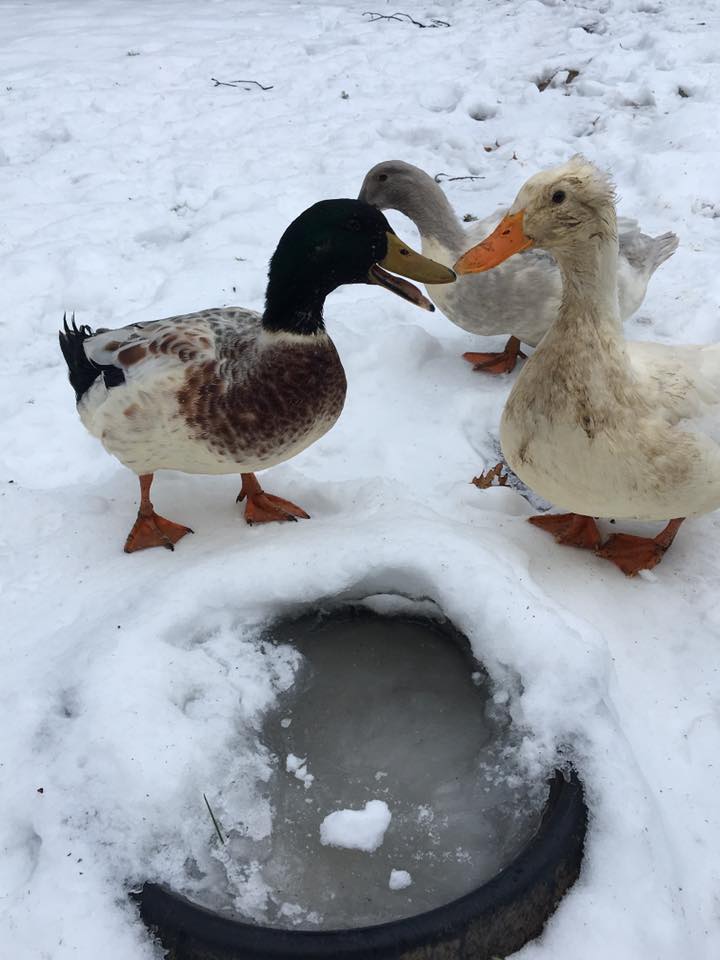
Food
Quality layer pellets should make up the majority of their diet, just like for the rest of the year. To conserve energy on short winter days, you will likely notice a decrease in egg production. Even with fewer eggs, the nutritional needs are still there.
In the winter, I like to also offer scratch grains in the evenings before bed. The ducks love this little treat. The grains take longer to digest, upping their body temperature during the night when it’s coldest.
Other good winter treats are protein rich meal worms, fresh greens like lettuce, kale or wheat grass. Click here to learn how to grow your own wheat grass. Warm plain oatmeal or warm fermented feed are other good choices. click here to learn how to ferment feed
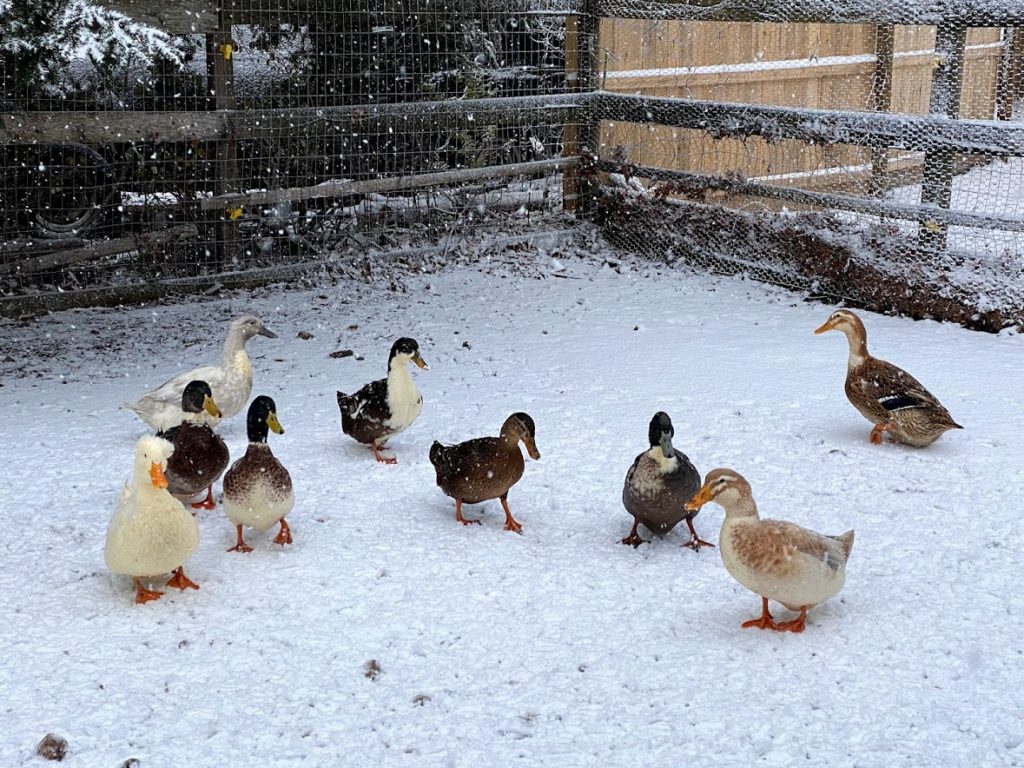
Shelter
Ducks are slow on land and predators are always on the prowl for a meal in the winter when prey can be scarce. It is important to provide a safe, predator-proof shelter for your birds at night. This can be in a totally enclosed coop or a three-sided shelter inside a secure run.
Ducks like to nest on the ground. Provide them with a secure place where they can escape the wind. Add in plenty of straw to arrange a cozy nest. Bales of hay or straw can act as great insulators and draft blockers by stacking them along the walls of the coop.
While their feet can withstand standing on the frozen ground, they will be much more comfortable if you lay down a layer of straw for them to walk on in the run. During the day, they will likely still enjoy roaming the yard, even when it’s covered with snow. They will have a grand time digging their heads into it, shoveling it with their bills, and “floating” on it (sitting in the snow with their feet pulled into their body).
But even during the day, make sure they have somewhere they can escape the winds. I do not recommend adding heat lamps to the coop. They are unnecessary and with all the dry bedding and erratic movements of birds, there is a real risk of fire. The fire could endanger the life of your flock. It could spread to your home or neighbor’s home endangering human lives. It’s just not worth the risk involved!
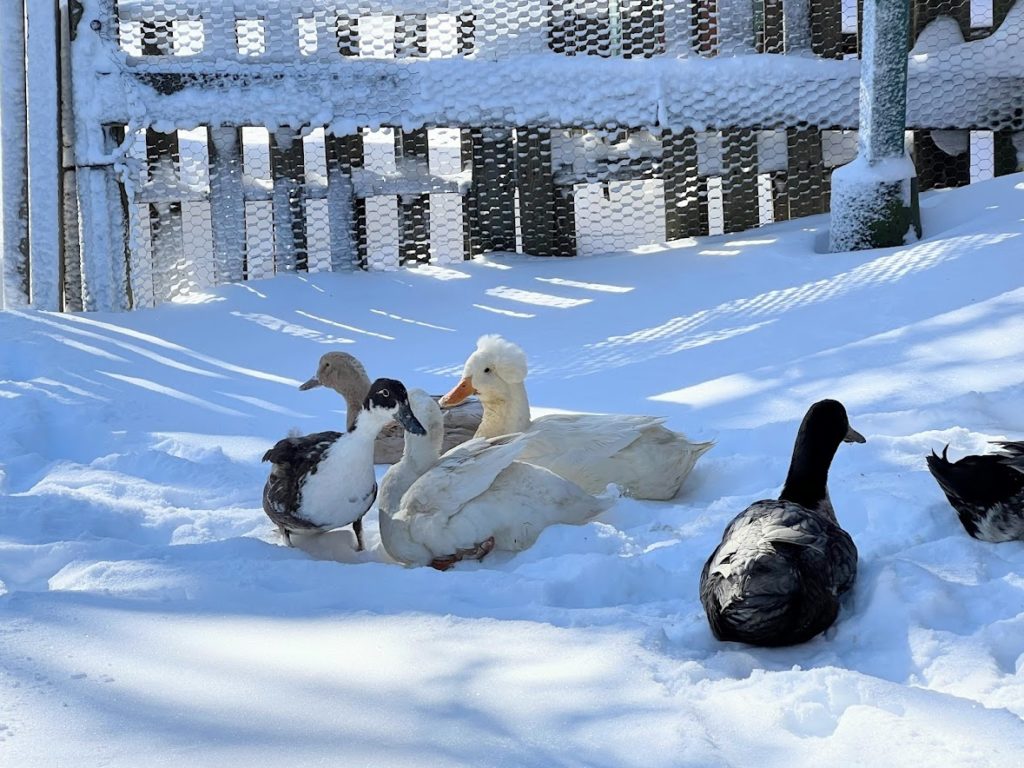
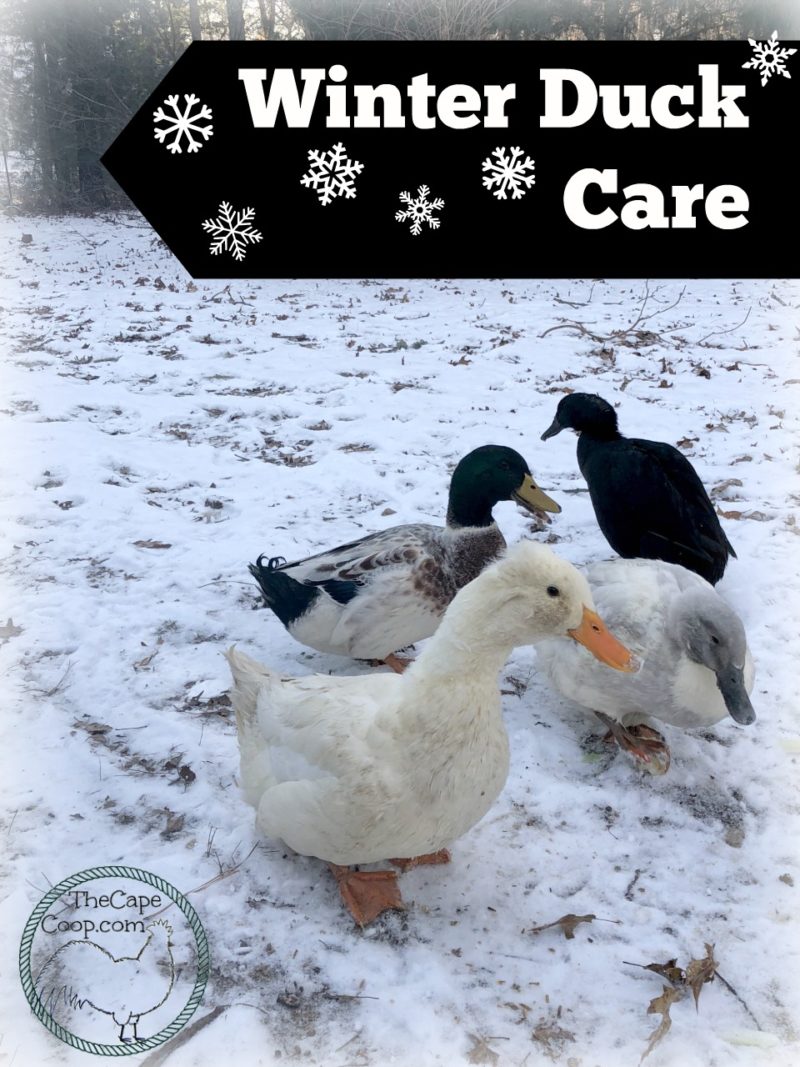
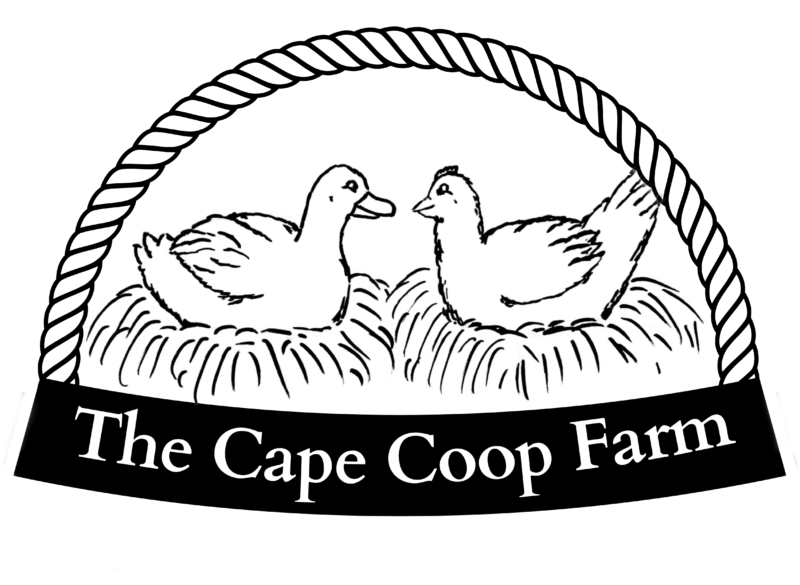
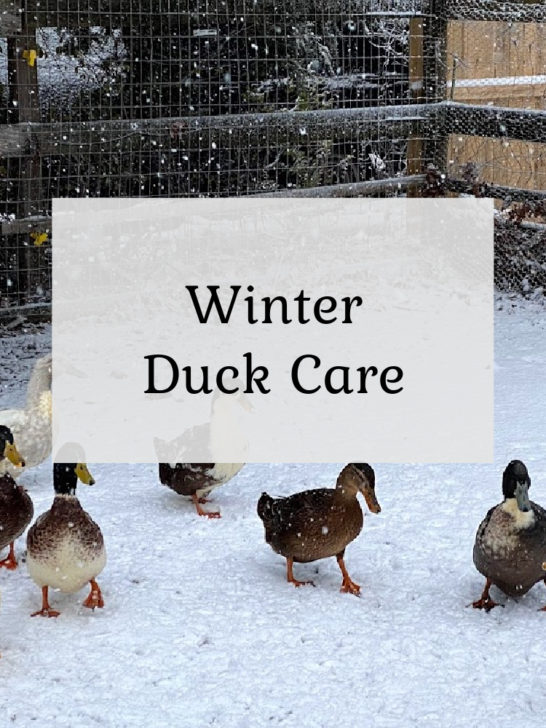
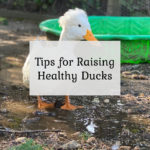


Debbie
Tuesday 12th of December 2023
Thanks for the tips. I put plastic tarps around my pen to cut the wind. Tarp on top of the pen without a roof. They really help. Keeps out the snow mostly and a lot of rain. My ducks have a duck house. They prefer to sleep outside in the pen. I do keep a trough in part of the pen with a de icer in it. They still head for the ice cold pond every day when I let them out. In and out all day long. I do keep a huge heated dog water bowl in the pen. The pen is all locked down at night. See my post to Kenneth. I'm in Northern Nevada so it does get cold here. They did fine last winter and we had 4 feet of snow almost all winter. Ducks have built in snowshoes.
Penny
Thursday 6th of January 2022
Hi Liz, I also live in New England and I have pet ducks and chickens that like to go roam around outside their enclosure for an hour or so every day. With the ice that we had yesterday and the snow that is coming, I am wondering if we can use pet friendly ice melt on our walkways? Will it hurt the ducks or chickens at all? Love your blog!!
Liz
Saturday 8th of January 2022
Hi Penny! Thank you! you definitely want to avoid using traditional deicer or “rock salt” because that is toxic to poultry. Pet safe deicers are usually made from Magnesium Chloride which is much less toxic and could be ok as long as they have access to plenty of liquid water to flush it from their system. The best option is to use sand in areas the poultry go, it doesn’t melt ice the way a deicer would but it does help with traction
Kenneth Queen
Monday 4th of January 2021
Hello Liz - I enjoy your website! You do a great job providing information for the duck owners of the world.
I have raised ducks for several years and have a very unique situation with my last group I've never experienced in the past. There are 14 in my latest group.
Usually, the ducks I raise don't make it past the 6 month mark, due to wildlife, turtles, dogs, etc. But with this group, I'm happy to say all 14 of them are alive and doing well (physically) after being hatched June 1 2020.
Here's the reason I'm writing - None of my ducks will get in the 3-acre pond available to them. It's actually in my back yard, and they eat, drink and play all day - everyday - right next to the pond. Regardless of the methods I've tried, they REFUSE to get in the pond.
On the very few occasions I have managed to get them in the pond, they jump out and run as fast as they can - away from the water!
I've seen them all run jump IN the water to get away from dogs chasing them...only to run OUT of the water the second danger is gone. It's the craziest thing (duck thing) I've ever seen.
I was hoping you may be able to shed some light on this bizarre behavior, or maybe point me to someone that could.
During these 6 past months, they are now ruining my yard. All the grass is dead (before Fall), and my backyard is now basically a mud paying field.
Any light you could lend on the subject would be welcomed. As you might imagine, I'm getting quit anxious to get these guys in the water...for their sake and mine!
Thanks again, Kenneth
Debbie
Tuesday 12th of December 2023
@Kenneth Queen, Hi Kenneth, I had the same thing happen with my original 2 ducks. I have a huge pond. A mallard and a Peking duck. Neither would get in the pond. I had troughs for them and I guess the pond was too big. Then my duck went broody. Only 1 chick survived so I got 3 more babies from tractor supply. Mama duck didn't want any of them. Long story short I became mom. When they were old enough to go out, I put them in the trough. Then I put them in a portable dog fence by the pond. They didn't know what to think at first. But got used to it. Finally one day, they just jumped in. Swam and dove like crazy. Then I'm going, how do I get them out. Well they came out for treats. When the original 2 ducks saw the young ones in the pond they jumped in too. It was a few arguments and chasing at first, but now they're all settled down. Now when I let them out of the pen it's a race to the pond. They spend all day there. In and out. Resting on the sides. Up and down the waterfalls and stream beds. Be careful what you wish for. My pond had water lilies, all gone before winter set in. I had iris that had gone around the pond, in the pond. I cut them down summer and fall. Now the iris are all down, because the ducks lay in them. They also have eaten and pulled out a lot. I know they'll come back next year, but they're a little rough looking right now. Don't know if the water lilies will come back. I know there's koi in there some where. The water is stirred up so you can't see them. It's a deep pond so they can hide. But the ducks are happy.
Liz
Tuesday 5th of January 2021
Hi Ken, are these ducks a different breed from the ones you usually raise? Many domestic duck breeds enjoy swimming but generally spend more of their life on land, wild breeds generally spend most of their life on the water. If the breed you have now is predisposed to living on land, there isn't much you can do to change their minds. You can put up some simple wire fencing to keep them from parts of your yard if you like. My other thought is maybe something spooked them in the pond - maybe a turtle or other predator. If that is the case they could just need time to remember how fun swimming is. To encourage them to spend more time by the pond I would move things like their shelter and food close to the shore of the pond if they aren't already. Try tossing things like cheerios into the pond, they love them and they will float on the water, hopefully encouraging them to spend more time there. Good luck!
jim
Thursday 12th of November 2020
I have been keeping ducks for over 30 years. I remember at the start how hard it was to get good advice on how best to look after them. Especially the type of thorough and considered advice you offery. Newcomers have it relatively easy now - as long as you keep up the good work.
Liz
Thursday 12th of November 2020
Thank you so much! I was a young adult when the internet really started coming into it's own, so I certainly remember the struggles lol. I can't imagine how we lived without the wealth of information available now!
Carlee
Monday 21st of October 2019
Great tips! I plan to read many more postings as I am new to owning ducks. I have 4 males and 6 females. Would you say I have too many males?
I live in Northern Canada where our winters can range from -20 to -50 degrees Celcius. So very cold! Would you recommend a heat lamp at those temperatures?
Do you have any tips on how to get your ducks inside at night? My ducks are not very tame yet.
Any feedback is appreciated!
Liz
Monday 21st of October 2019
Hi Carlee - welcome to the fun of keeping ducks! Its best to have at least a few females per every male, but it really depends on your drakes' temperaments. Right now I have 3 males and 6 females and they do fine. The males get along and seems to have enough females to keep them "busy" during spring & summer mating seasons.
Brrrrrr!! That is super cold!! Heat lamps can be quite dangerous so they aren't really something I ever recommend unless it's something you are around to monitor (which is unlikely unless the ducks are living in your house!). I would recommend you have a sturdy shelter they can retreat to. Get them in the habit of being locked in their house at night now so they will be ready in the winter. The shelter will help block winds and snow, but be sure there is plenty of ventilation. Ducks are always so moist and their breathing and poop gives off a lot of moisture. You need to provide ventilation for that moisture to escape or they will be open to frostbit and lung issues. Just put the ventilation up high so it isn't creating drafts on them as they sleep. Give them plenty of warm, clean straw to snuggle into.
When it gets to be around dusk, your ducks will likely be looking for somewhere to bunk down for the night. Give them some incentive to make their place their duck run & house by providing some of their favorite treats. I always use mealworms, by birds will do literally anything for mealworms lol. Put a pile of the treats in their run/house and herd them into there. Do this for several nights and they should get the hang of it. My ducks automatically go to their run at dusk now, no treats required. :)